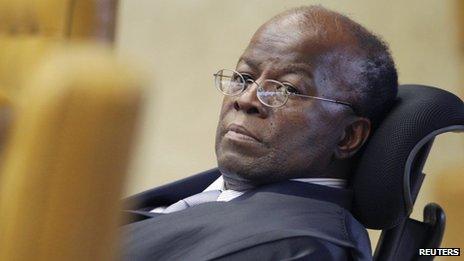Barbosa made first black head of Brazil's Supreme Court
- Published

Barbosa's rulings in the Mensalao trial angered former President Lula's supporters
The judge overseeing a major corruption trial in Brazil has been appointed president of the Supreme Court, the first black person to hold the post.
Judge Joaquim Barbosa, who was born into a poor family, has been praised for his judicial independence.
He will take over the post once the "Mensalao" corruption trial ends.
Brazil has the largest black population after Nigeria. Many are descended from African slaves, but black people rarely achieve high office.
Mr Barbosa, 58, was elected by his fellow judges, following the Court's tradition of nominating its most senior member.
Born in the remote town of Paracatu in the state of Minas Gerais and the son of a builder, Mr Barbosa was educated in Brazil's much criticised state school system.
He later moved to the capital, Brasilia, where he studied for a law degree at the city's best university.
To support himself through university, he worked as a typist and a cleaner in one of the city's courts, and later began a successful career as a public prosecutor.
'Invisible barriers'
In 2003, he became a household name in Brazil when he was appointed by then President Luiz Inacio Lula da Silva to the Supreme Court.
Two mixed-race judges had previously been members of the court, but Mr Barbosa said he was the first one who could be "widely recognised as a black man".
"This act has great significance, as it indicates to society the end of certain visible and invisible barriers," he said at the time.
He has been in the spotlight in Brazil in the last two months as the rapporteur of the case against some of former President Lula's key aides.
The case became known locally as "Mensalao", or "the Big Monthly" allowance.
Judge Barbosa angered government supporters when he convicted senior members of the Lula government.
On Tuesday, former chief of staff Jose Dirceu, the Workers' Party's former president, Jose Genoino, and treasurer Delubio Soares were found guilty of corruption.
Most judges in the Supreme Court agreed with Mr Barbosa's report, in which he accused the three men of using public funds to pay members of Congress for support in crucial votes.
Lula was not implicated in the scandal.
- Published10 October 2012
- Published31 August 2012
- Published16 November 2013
- Published17 November 2011